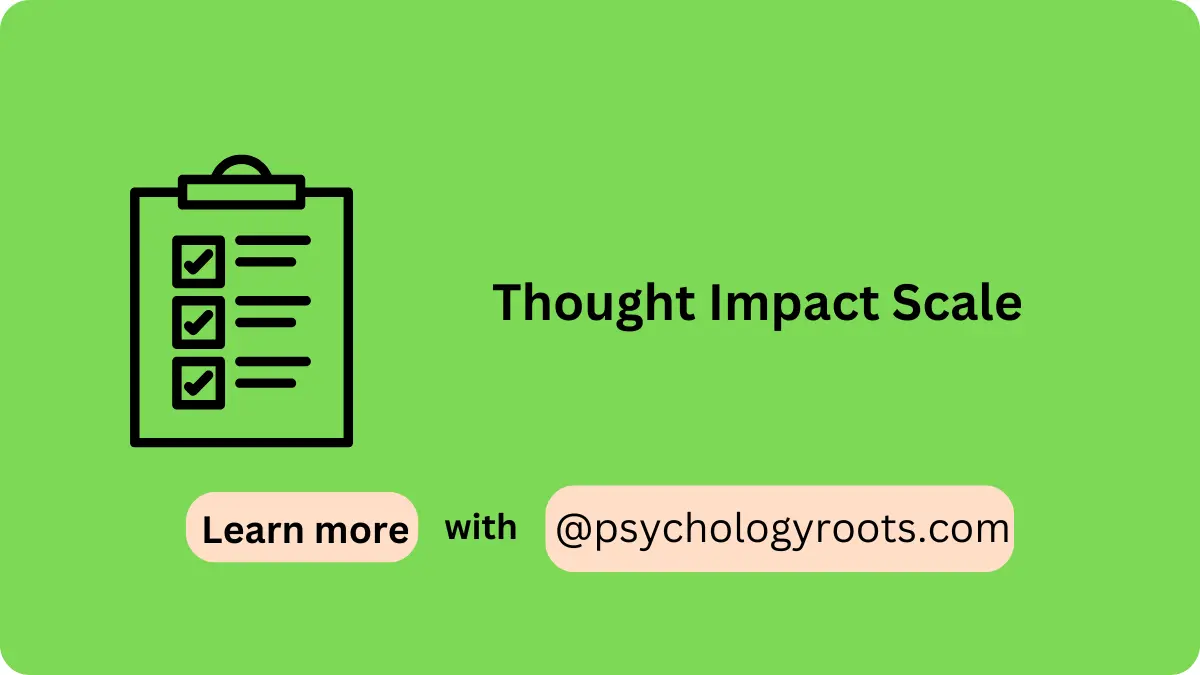Table of Contents
Thought Impact Scale
Here in this post, we are sharing the “Thought Impact Scale”. You can read psychometric and Author information. We have thousands of Scales and questionnaires in our collection (See Scales and Questionnaires). You can demand us any scale and questionnaires related to psychology through our community, and we will provide you with a short time. Keep visiting Psychology Roots.
About Thought Impact Scale
Scale Name
Thought Impact Scale
Author Details
Olafur S. Palsson, Psy.D.
Translation Availability
English

Background/Description
The Thought Impact Scale (TIS) is a self-report instrument developed to measure the psychological trait of subconscious connectedness, which refers to the extent of interaction between an individual’s conscious mind and non-conscious mental processes in daily life. Recognizing that individuals vary in how their conscious thoughts influence and are influenced by subconscious processes, the TIS was designed to quantify this variability. The scale comprises 18 items that assess experiences such as:
- Intuitive Insights: Spontaneous understanding or knowledge without conscious reasoning.
- Emotional Resonance: Deep emotional responses that arise without explicit triggers.
- Automatic Thoughts: Thoughts that emerge involuntarily and may guide behavior.
Respondents rate each item on a 5-point Likert scale, ranging from “Strongly Disagree” to “Strongly Agree,” reflecting the frequency or intensity of these experiences. Higher scores indicate a greater degree of subconscious connectedness. The TIS has been utilized in research to explore its association with various psychological phenomena, including susceptibility to hypnosis, vividness of mental imagery, and responsiveness to hypnotherapy. Studies have found that individuals with higher TIS scores may experience more vivid imagery and a greater sense of automaticity during hypnosis sessions.
Administration, Scoring and Interpretation
- Obtain a Copy: Access the TIS through the original publication by Palsson (2020) in the American Journal of Clinical Hypnosis or by contacting the author for permission to use the instrument in research or clinical settings.
- Explain the Purpose: Inform participants that the TIS aims to assess the extent to which their conscious thoughts interact with subconscious processes, providing insights into their cognitive and emotional experiences.
- Provide Instructions: Instruct participants to reflect on their typical experiences and indicate their agreement with each statement using the provided 5-point Likert scale.
- Approximate Time: The TIS typically takes about 5–10 minutes to complete.
- Administer the Scale: Ensure participants complete the questionnaire in a quiet, comfortable environment, free from distractions, to facilitate honest and thoughtful responses.
Reliability and Validity
The TIS has demonstrated strong psychometric properties. In the initial validation study, the scale exhibited high internal consistency, with a Cronbach’s alpha coefficient of 0.91, indicating reliable measurement across its items. Construct validity is supported by significant correlations between TIS scores and related constructs, such as hypnotic susceptibility and vividness of mental imagery.
For instance, higher TIS scores have been associated with greater imagery vividness and a heightened sense of automaticity during hypnosis sessions. These findings suggest that the TIS is an effective tool for assessing the degree of subconscious connectedness in individuals.
Available Versions
Multiple-Items
Reference
Palsson, O. S. (2020). Development and validation of the thought impact scale: A measure of subconscious connectedness. American Journal of Clinical Hypnosis, 62(3), 198-230.
Palsson, O. S., Ballou, S., & Walker, M. E. (2022). Association of Thought Impact Scale Scores with Hypnosis Treatment Responses and Hypnotherapy-Seeking: A Confirmation Study. The International journal of clinical and experimental hypnosis, 70(1), 28–48. https://doi.org/10.1080/00207144.2022.2003696
Important Link
Scale File:
Frequently Asked Questions
What is the purpose of the Thought Impact Scale (TIS)?
The TIS is designed to assess the extent to which an individual’s conscious mind interacts with subconscious processes, termed subconscious connectedness.
Who developed the TIS?
The scale was developed by Dr. Olafur S. Palsson, with the initial validation study published in 2020.
How is the TIS structured?
The TIS consists of 18 items that measure experiences related to intuitive insights, emotional resonance, and automatic thoughts, rated on a 5-point Likert scale.
How is the TIS administered?
Participants self-report their experiences by indicating their level of agreement with each statement, reflecting on their typical cognitive and emotional interactions with subconscious processes.
Is the TIS a reliable and valid measure?
Yes, the TIS has demonstrated high reliability and validity, with studies showing strong internal consistency and significant correlations with related constructs such as hypnotic susceptibility and imagery vividness.
Disclaimer
Please note that Psychology Roots does not have the right to grant permission for the use of any psychological scales or assessments listed on its website. To use any scale or assessment, you must obtain permission directly from the author or translator of the tool. Psychology Roots provides information about various tools and their administration procedures, but it is your responsibility to obtain proper permissions before using any scale or assessment. If you need further information about an author’s contact details, please submit a query to the Psychology Roots team.
Help Us Improve This Article
Have you discovered an inaccuracy? We put out great effort to give accurate and scientifically trustworthy information to our readers. Please notify us if you discover any typographical or grammatical errors.
Make a comment. We acknowledge and appreciate your efforts.
Share With Us
If you have any scale or any material related to psychology kindly share it with us at psychologyroots@gmail.com. We help others on behalf of you.